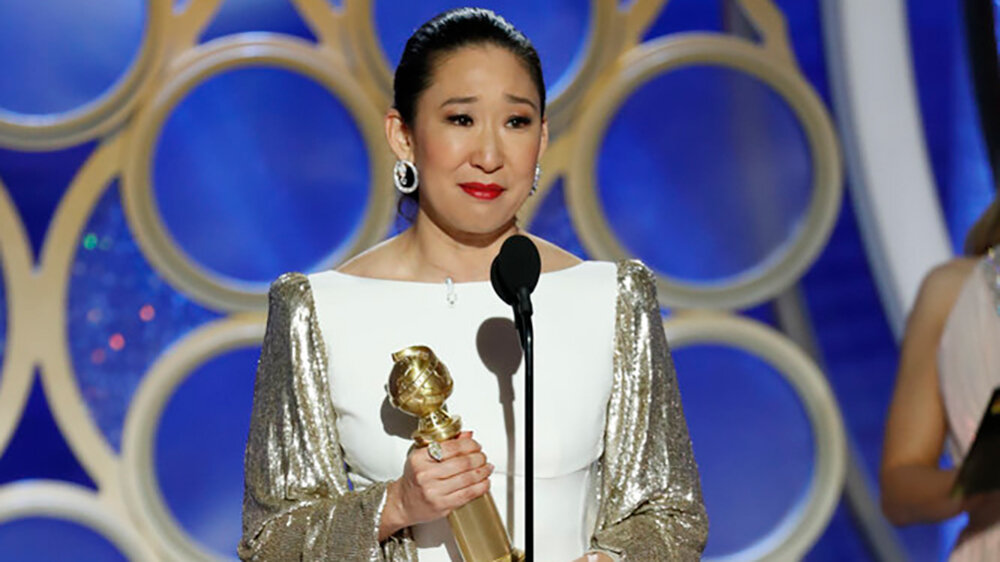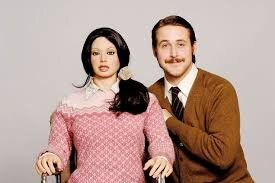Sandra Oh, Hollywood, Christianity, and the Never Ending Centering of White Dude Narratives
Two nights I was scrolling through Facebook and came across this post by my friend Stephanie, fellow Korean American and women pastor.Her post said, "I’ve never seen Killing Eve the show but SANDRA OH just won best actress - and honored her Korean immigrant parents addressing them, “Umma. Appa. Sa-dang-hae-yo.” “엄마! 아빠! 사랑해요!”Translation: Mom. Dad. I love you.Then, she did an insa (bow) to honor them! She bowed in front of Hollywood and the world.
I began to cry, scream, then my kids attacked me with hugs."
I had not been watching the Golden Globes, but I was in tears just reading the description of this moment. I quickly jumped on twitter to find video clips of her acceptance speech. It was so beautiful. First of all, Sandra Oh looked stunning, and fully like a Korean American woman. (I know she is Korean Canadian, but I have claimed her for the entire continent.) When the camera panned to her parents, my heart just sang. You NEVER see Koreans of that generation in mainstream media. Her parents look like my mom, my aunt, my uncle, like every elder and pastor that I grew up with. And their faces were beaming with so much pride. I could write an entire post on the yearning that most Asian American have to see their parents look at them with that much adoration and pride… but I’ll save that for another day. When Sandra closed her acceptance speech by speaking to them in Korean, (I am tearing up just writing about it) I lost it. At a visceral level it was validating and affirming. That’s the way I heard “I love you” spoken all my life. It is the way my mom says it to me today. When we bow, especially in a moment like that, it is an offering of love, respect, and honor all at once. Everything about that moment hit me. It is not just what she said, change is embodied as much as it is spoken. I spent a lot of the night pondering the significance of her presence as host and her acceptance speech. In the end, I turned to the intersection of this moment with my world as a Korean American woman pastor in the United States.
Hollywood and American Christianity
To me, Hollywood and American Christianity have a lot in common. They are both places that are run by white guys. They are both places that find the stories of white men endlessly fascinating. They say they are about one thing, creativity and Christianity respectively, but are really about another thing, capitalism and white supremacy. And they always see women of color as marginal side characters that are there to serve. Let’s start with Hollywood. I remember when “Lars and the Real Girl” came out in 2007. It is a movie about a guy who has a romantic relationship with a doll. That was my tipping point. Like, y’all people can’t make one movie with an interesting Asian American woman lead, but you can make this movie? You want a movie that includes weird white guys and the internet, make a movie about an Asian American woman trying to find a man on a dating app! It had already been almost 15 years since Joy Luck Club, and I hadn’t seen an Asian American woman, couple, family on the big screen since. Yet every iteration of white guy narratives was being produced. White male narratives are framed as endlessly fascinating.
white guys doing cocaine off of women’s butts
white guys saving the world
white guys in the mob
white guys who turn into wolverines
white guys who have magical hammers
white guys selling drugs
white guys who are undercover cops
white guys who have drug addictions
white guys who pursue women who aren’t interested
white guys who are sexy dancers,
How many movies about white guys and baseball do we need?
Build a field and reconnect with your dad
Trouble with the Curve - a movie about an old white guy who recruits from the minor leagues
Moneyball which billed itself as “more than baseball, it's a revolution.” It was the revolution of a movie about white guys and baseball
I could go on and on.There is a belief that every angle of white male narrative is fascinating. That their story is the best ways to explore universal truths. That the vehicle of white heterosexual male narratives is the best way to explore the world. It is not. And it is a very very narrow slice of the world, and a very narrow slice of the stories that can be told. Christianity is also preoccupied with the stories of white men. White pastors and their church plants. White male pastors and their books. White male pastors and their conferences. White worship leaders and their songs. White theologians and their esoteric explorations. Preoccupied with the biggest ones, the fastest growing, the blockbuster churches, sorry, they’re called mega churches. Every week the pulpit is the story that white men want to tell about the world. Theology, exegesis, and preaching are all narrative and interpretation. They will tell you it is universal truth, but it’s not. When men are the ones doing all the Biblical interpretation, it’s all slanted one way. Look at how Christmas has historically been talked about. Mary is moved to the margins of the Christmas story, her theological acuity dismissed, her agency ignored. Mary did you know?Yeah - she knew! How they hell did she come up with The Magnificat? The angel came to her, they had a conversation. Go sing a song called, Zechariah, ya blew it. Just like Hollywood, in the church, when men tell the story, women become window dressing, side characters, interesting in as much as they tell us about the male characters.
Church Planting
The story of church planting is a great example of this. Church is about community, breaking bread together, and the mystery of growth. It is often described in organic and mysterious terms in the Bible. But in the hands of white masculinity it gets turned into a system that can be diagrammed, charted, replicated, and essentially becomes a business model. It is a white male process I like to summarize as, Grow it bigger! Grow it faster! Penis penis! White supremacy! Let’s write a book and make a conference. Look at me, I’m successful for Jesus! Come do it just like me, everyone just mimic what made money and drew a lot of people, we’re a franchise! Be like the Avengers, just keep redoing the same thing again and again. Is it Hollywood? Is it Evangelicalism? I can’t tell!The centering of white male narratives hurts all of us, including white men. It narrows our understanding of the world, and it narrows our understanding of God. I’ve seen a Chinese American woman plant a ministry primarily through her gifts of hospitality and deep relational leadership development. I’ve seen Black and Native men start churches that reject the hierarchy that white men so implicitly embed into their ministries. I’ve seen women imagine Christian community that isn’t primarily about controlling and patrolling. These are the are stories that need to be told, and need to be heard. Sandra Oh remade hosting through the lens of her lived experience as a Korean Canadian. It was sincere, amiable, funny, vulnerable, and totally Korean American. Ricky Gervais modeled hosting through the lens of British white guy humor, eviscerating and roasting. Tina Fey and Amy Poehler did a pretty solid version of white feminism. Their camaraderie was lovely, they were funny, but whenever they tried to include POC in the story, it was awkward. Sandra showed us what hosting and an acceptance speech looks like through a Korean North American lens. And it added something, it expanded the experience of the evening. It expanded the definition of hosting, of actor, even of an acceptance speech. And her very Korean expression, was universally understood. I saw people of all backgrounds celebrating her win, and loving her parents, and embracing her acceptance speech. So Korean American womanhood can also be a vehicle for universal truths and broadly relatable experiences. If Christianity is, in fact, concerned with relating to an amazing, omniscient, expansive, beyond language, beyond culture, beyond time, beyond space, living God that is revealing themselves to us in an ongoing way- are we sure that 98% of the reflections we hear about that God should come from privileged, educated, white, male English speakers between 35 and 70 from Europe and the US? Are we increasing or decreasing our chances of catching a glimpse into the unknowable? It shouldn’t be such a rarity to have an Asian American woman up front, or on the stage, at the pulpit, or at the center of the story; in Hollywood or in the church. And POC of color shouldn't have to be beyond spectacular to be a part of the conversation. Black Panther was extraordinary and reimagined the superhero genre. But it had to be the 9th highest grossing movie of ALL TIME, to be in the conversation. This actually merits a post of its own. So I will stop here. But I want to name that black actors and directors have been pushing this conversation for a long time, and black preachers, and particularly black women preachers have been pioneering this conversation in the pulpit for a long time. And I always want to acknowledge those who have gone before. Cheers Sandra Oh- Thank you for making the the Golden Globes a beautiful reflection of Korean North American womanhood. Looking forward to more of this in the church as well.






